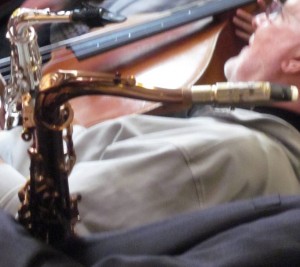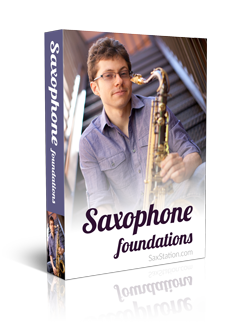 Question about chord tones and how to use them in a sax solo….. Are they the only notes you should play? And should you use the rest of the scale as well?
Question about chord tones and how to use them in a sax solo….. Are they the only notes you should play? And should you use the rest of the scale as well?
A few ideas about chord tones and improvisation on sax:
The chord tones include defining notes for the chord. A minor chord isn’t a minor chord unless it has that minor third between the root and the third. The seventh is also very important. The other chord tones add color to what you’re playing.
So if you’re going to emphasize a note, the 3 and 7 tend to be good choices.
Higher extensions – 9, 11, etc can be interesting too. As well as alterations. The notes give you different colors to play around with.
However, you shouldn’t only play chord tones in your sax solos though, that would be very restrictive and not very interesting. Early on with your improvisation, you can somewhat mechanically play around with more vertical (arpeggiated) ideas and more horizontal (scalar) lines. Getting comfortable with different approaches will make your playing more musical since you aren’t worrying about the individual notes you’re going to play.
When you speak, you don’t worry about the letters in the words you’re saying, the words and phrases just come out of your mouth most times without a lot of deliberation.
Knowing how to effectively use the colors of the notes while also having your tone, dynamics, phrasing, rhythm, articulation and other dimensions of playing music in control is challenging, but it comes with practice and experience.
And remember, the ‘right’ note in the wrong place isn’t ‘right’ anymore. Also, the ‘wrong’ note with good timing, articulation, etc probably won’t sound as bad as you think it might, could even lead you in an interesting direction. You can always go up or down by a half step and get to a ‘right’ note.



Would someone please tell me if they know what are the best “sax chords” as opposed to the guitar chords us horn players have to endure when jaming with the ubiquitous guitar dominated jam sessions? You know everything is usually in open E or something that usually forced the F# or C# scales on us. I’ve tried to ask them to change at times but end up sounding like an idiot. I heard an interview with an old blues-jazz horn guy who was talking about this issue and actually listed the best horn chords but I didn’t take notes(pun not intended). Anyone hip to dis?
You probably mean either the ones that are physically most comfortable or most comfortable because of familiarity. Sometimes the same, not always.
Probably F, Bb, Eb.
Because of transposition, those tend to be comfortable for saxophones in Eb (alto/bari) and Bb (tenor/soprano)